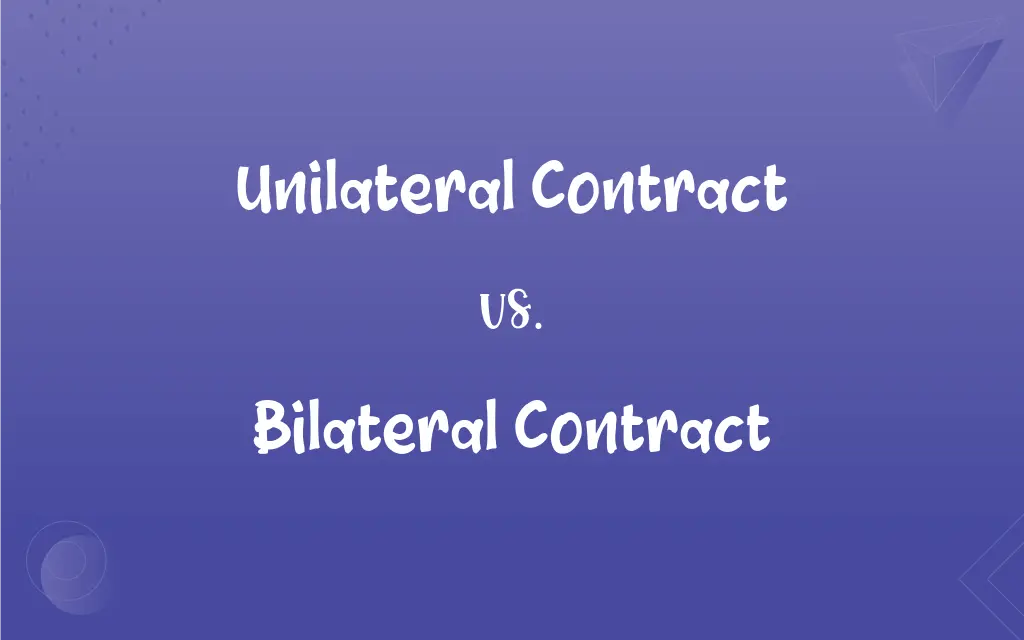Unilateral Contract vs. Bilateral Contract: What's the Difference?
Edited by Harlon Moss || By Janet White || Published on November 23, 2023
A Unilateral Contract involves a promise in exchange for an action, while a Bilateral Contract involves mutual promises between two parties.

Key Differences
In a Unilateral Contract, one party makes a promise contingent upon the other party performing a certain action. On the other hand, a Bilateral Contract involves both parties exchanging promises, and each becomes obligated to fulfill their respective promises.
A characteristic feature of a Unilateral Contract is that it becomes binding only when the party performs the specified action. In contrast, a Bililateral Contract becomes binding once both parties agree, irrespective of any subsequent performance.
Both Unilateral Contracts and Bilateral Contracts have their place in legal and business dealings. For instance, reward offers are typically Unilateral Contracts; if someone meets the condition (e.g., finding a lost pet), they can claim the reward. On the flip side, most everyday contracts, like buying a car or hiring an employee, are Bilateral Contracts where both parties have clear obligations.
With Unilateral Contracts, the party making the promise has no right to demand performance since the second party hasn't made any promise. Whereas in Bilateral Contracts, both parties can expect and demand the performance because of the mutual promises made.
It's essential to identify whether a contract is Unilateral or Bililateral because the rights, obligations, and potential legal remedies can differ. While a Bilateral Contract typically obligates both parties from the outset, a Unilateral Contract does so only upon the completion of the specified action.
ADVERTISEMENT
Comparison Chart
Promise Structure
One party promises in exchange for an action.
Both parties exchange promises.
Binding Nature
Becomes binding upon action performance.
Binding once agreed, regardless of performance.
Demand of Performance
No right to demand action since only one promise exists.
Both parties can demand performance due to mutual promises.
Typical Examples
Rewards, contests, etc.
Sale contracts, employment agreements, etc.
Obligation Start Point
Obligation arises only when the specified action is performed.
Obligations start as soon as both parties agree, even before any actual performance occurs.
ADVERTISEMENT
Unilateral Contract and Bilateral Contract Definitions
Unilateral Contract
The party making the promise cannot demand the action.
A Unilateral Contract to pay for a delivered newspaper doesn't oblige anyone to deliver it.
Bilateral Contract
The contract becomes binding upon agreement, not action.
Once both parties agree in a Bilateral Contract to trade a car for a sum of money, they are both bound.
Unilateral Contract
Such contracts are often used when the promisor is unsure if anyone will fulfill the action.
A Unilateral Contract in a treasure hunt only binds the organizer if someone finds the treasure.
Bilateral Contract
It's the most common type of contract in daily transactions.
A lease agreement, where one party promises a space and the other rent, is a typical Bilateral Contract.
Unilateral Contract
A Unilateral Contract is based on one party's promise in return for another's action.
If you find my lost dog, I'll pay you $500 is a Unilateral Contract.
Bilateral Contract
Both parties can demand performance based on the promises.
In a Bilateral Contract for a service, both the payment and service provision can be demanded.
Unilateral Contract
It doesn't require mutual promises from involved parties.
The announcement Reward for a lost watch creates a Unilateral Contract.
Bilateral Contract
Both parties have respective obligations and expectations.
An employment agreement, where an employer promises to pay salary and an employee to work, is a Bilateral Contract.
Unilateral Contract
One party is legally bound only when the other completes a specific task.
In a Unilateral Contract, offering a prize for winning a race binds the offeror only if someone wins.
Bilateral Contract
A Bilateral Contract involves mutual promises between two entities.
A sale agreement where one promises to sell and the other to buy is a Bilateral Contract.
FAQs
Can both parties demand performance in a Bilateral Contract?
Yes, both parties can demand performance due to mutual promises.
Are reward offers Unilateral Contracts?
Yes, reward offers are typically Unilateral Contracts.
Can one party demand action in a Unilateral Contract?
No, since only one promise exists, there's no right to demand action.
Can a Unilateral Contract turn into a Bilateral Contract?
No, the nature of the contract is determined by the original promises and terms.
Are sales agreements Bilateral Contracts?
Yes, sales agreements where both parties have obligations are Bilateral Contracts.
What is a Unilateral Contract?
A Unilateral Contract involves one party's promise in exchange for another's action.
When does a Unilateral Contract become binding?
It becomes binding when the specified action is performed by one party.
Is an employment agreement a Bilateral Contract?
Yes, as both the employer and employee have promises to fulfill.
Why are Bilateral Contracts often written?
To clearly outline the mutual obligations and terms agreed upon.
How does a Bilateral Contract work?
In a Bilateral Contract, both parties exchange promises and have mutual obligations.
Can one revoke the offer in a Unilateral Contract?
Generally, offers in Unilateral Contracts can't be revoked once the other party starts performance.
Is a handshake deal a Bilateral Contract?
Yes, if both parties exchange promises, even orally, it's a Bilateral Contract.
What happens if one party doesn't fulfill their promise in a Bilateral Contract?
The other party may seek legal remedies due to breach of contract.
Which is more common: Unilateral or Bilateral Contracts?
Bilateral Contracts are more common in daily transactions.
Do Unilateral Contracts favor one party?
They can, especially if the action required is challenging with a disproportionate reward.
Can a Bilateral Contract have more than two parties?
Yes, as long as there are mutual promises among all parties, it remains bilateral in nature.
What's the main benefit of a Bilateral Contract?
Both parties have clear expectations and legal protections due to mutual promises.
What's an example of a Bilateral Contract?
A rental agreement where both the landlord and tenant have obligations is an example.
How can one exit a Bilateral Contract?
Either through mutual agreement, performance, breach, or other contract stipulations.
Do all Bilateral Contracts need to be in writing?
No, but written contracts provide clearer evidence and protection.
About Author
Written by
Janet WhiteJanet White has been an esteemed writer and blogger for Difference Wiki. Holding a Master's degree in Science and Medical Journalism from the prestigious Boston University, she has consistently demonstrated her expertise and passion for her field. When she's not immersed in her work, Janet relishes her time exercising, delving into a good book, and cherishing moments with friends and family.
Edited by
Harlon MossHarlon is a seasoned quality moderator and accomplished content writer for Difference Wiki. An alumnus of the prestigious University of California, he earned his degree in Computer Science. Leveraging his academic background, Harlon brings a meticulous and informed perspective to his work, ensuring content accuracy and excellence.






































































